Analysis of Business Ethics, Responsibility, and Sustainability
VerifiedAdded on 2021/02/19
|13
|3798
|32
Report
AI Summary
This report delves into the critical aspects of business ethics, corporate responsibility, and sustainability within the technology sector. It begins by defining business ethics and its importance, then explores key challenges related to corporate responsibility and sustainability, such as issues in HR, management, finance, and marketing. The report examines corporate social responsibility (CSR) methodologies, highlighting the impact on customers, suppliers, and employees, as well as environmental and economic considerations. It also discusses the drivers of CSR, including government regulations, stakeholder demands, and competitive labor markets. Furthermore, the report analyzes ethical and moral issues, providing recommendations for ethical business practices, including code of ethics and social responsibility initiatives, and emphasizes the importance of building a strong ethical foundation within enterprises to promote better working conditions and enhance the overall reputation of the industry. The report concludes by highlighting the importance of ethical standards and their positive impact on stakeholders and the community.
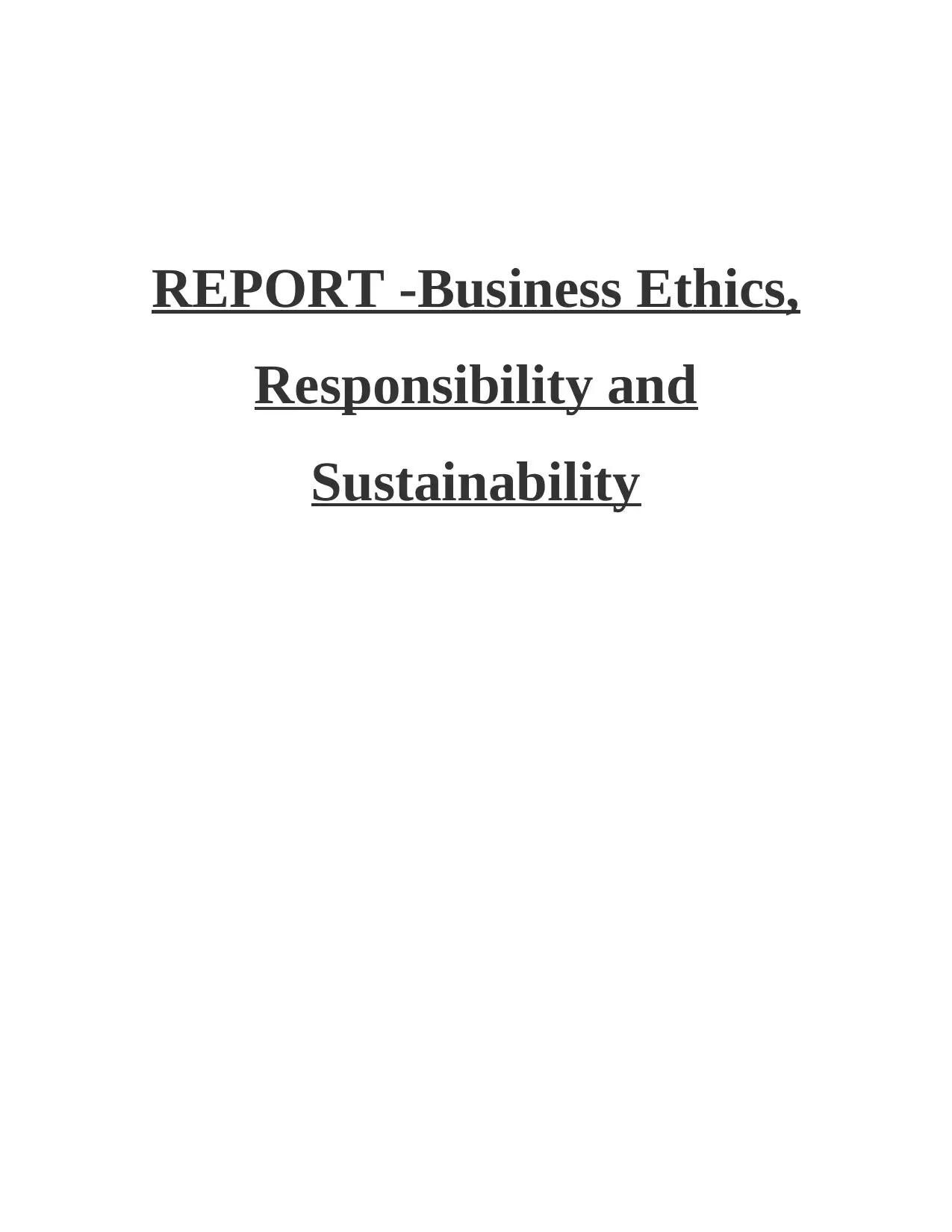
REPORT -Business Ethics,
Responsibility and
Sustainability
Responsibility and
Sustainability
Paraphrase This Document
Need a fresh take? Get an instant paraphrase of this document with our AI Paraphraser
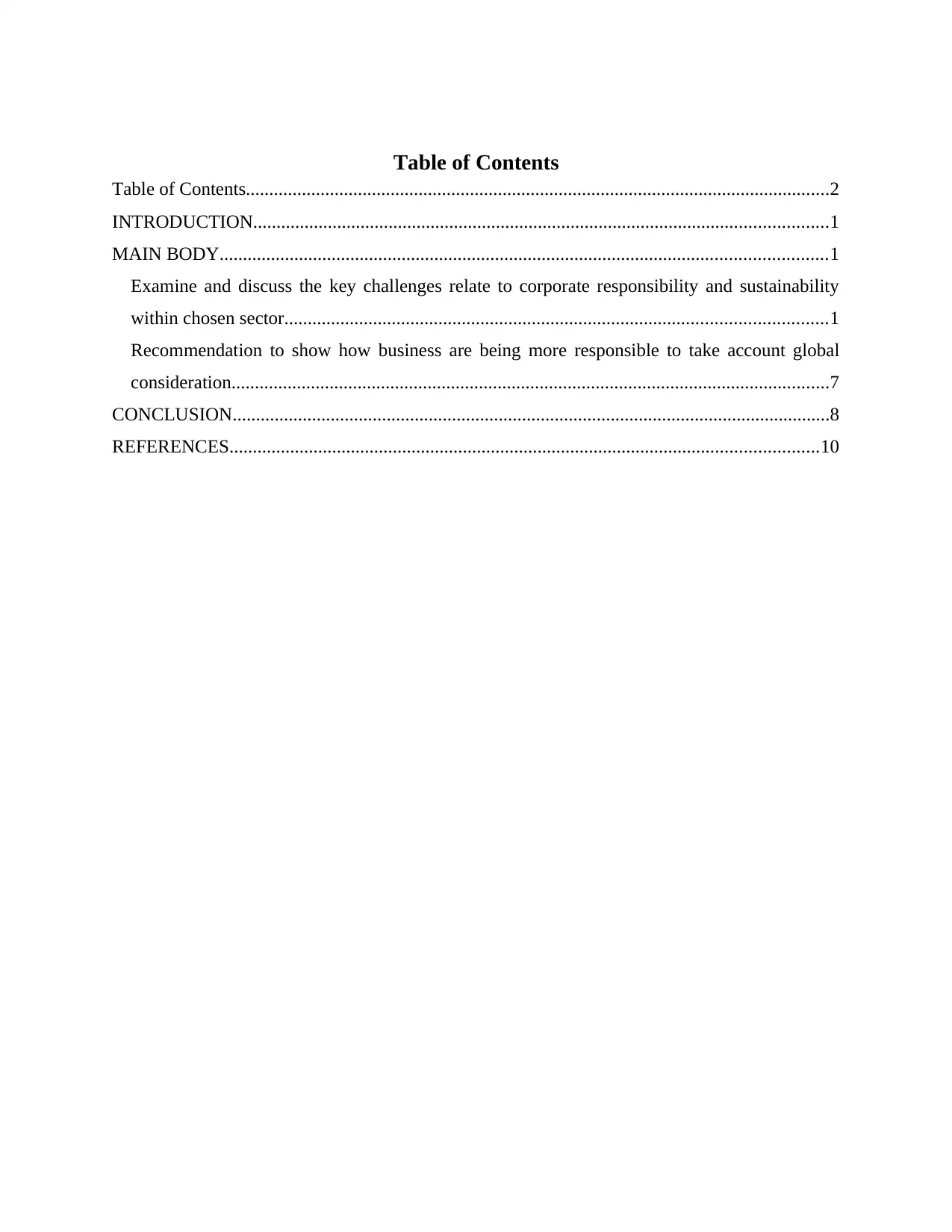
Table of Contents
Table of Contents.............................................................................................................................2
INTRODUCTION...........................................................................................................................1
MAIN BODY..................................................................................................................................1
Examine and discuss the key challenges relate to corporate responsibility and sustainability
within chosen sector....................................................................................................................1
Recommendation to show how business are being more responsible to take account global
consideration................................................................................................................................7
CONCLUSION................................................................................................................................8
REFERENCES..............................................................................................................................10
Table of Contents.............................................................................................................................2
INTRODUCTION...........................................................................................................................1
MAIN BODY..................................................................................................................................1
Examine and discuss the key challenges relate to corporate responsibility and sustainability
within chosen sector....................................................................................................................1
Recommendation to show how business are being more responsible to take account global
consideration................................................................................................................................7
CONCLUSION................................................................................................................................8
REFERENCES..............................................................................................................................10
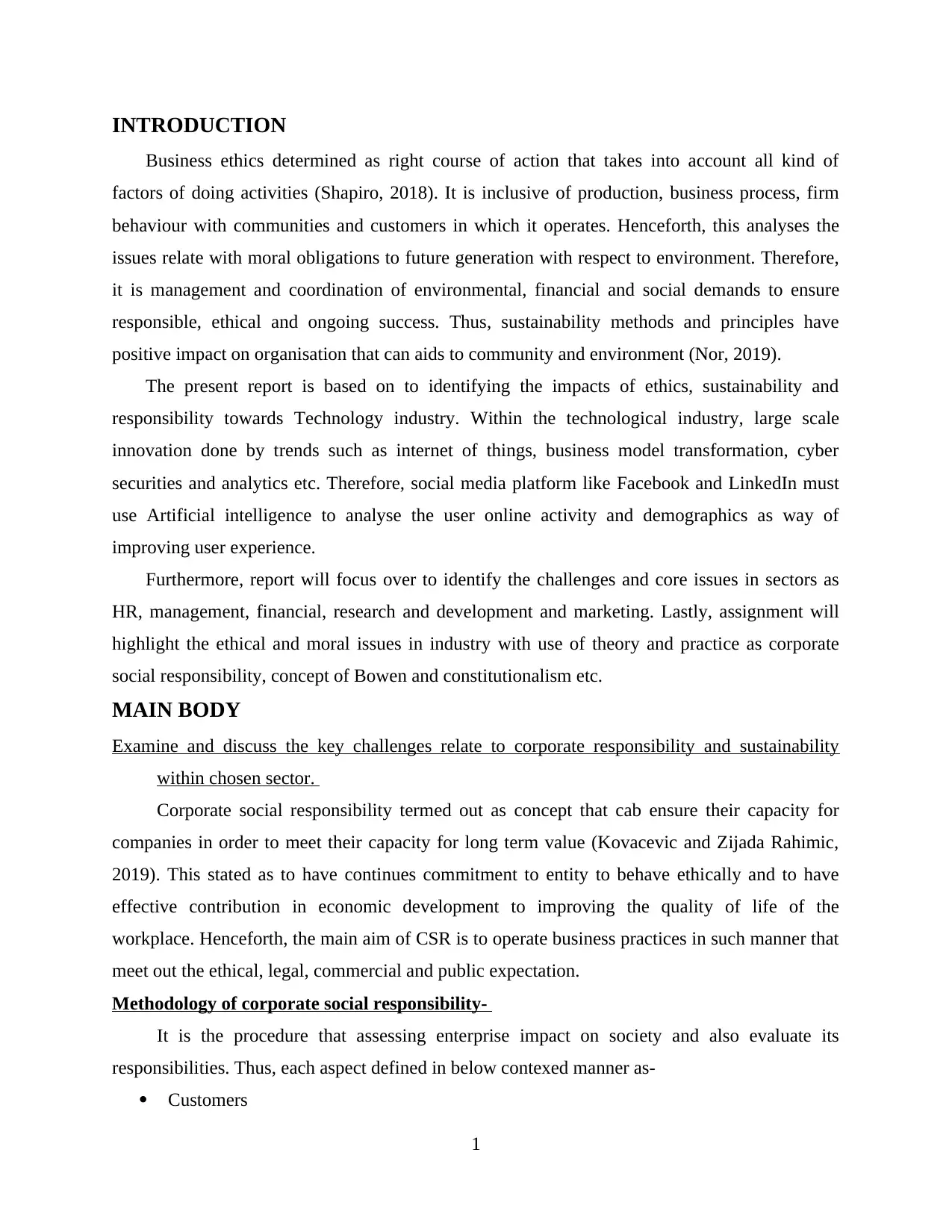
INTRODUCTION
Business ethics determined as right course of action that takes into account all kind of
factors of doing activities (Shapiro, 2018). It is inclusive of production, business process, firm
behaviour with communities and customers in which it operates. Henceforth, this analyses the
issues relate with moral obligations to future generation with respect to environment. Therefore,
it is management and coordination of environmental, financial and social demands to ensure
responsible, ethical and ongoing success. Thus, sustainability methods and principles have
positive impact on organisation that can aids to community and environment (Nor, 2019).
The present report is based on to identifying the impacts of ethics, sustainability and
responsibility towards Technology industry. Within the technological industry, large scale
innovation done by trends such as internet of things, business model transformation, cyber
securities and analytics etc. Therefore, social media platform like Facebook and LinkedIn must
use Artificial intelligence to analyse the user online activity and demographics as way of
improving user experience.
Furthermore, report will focus over to identify the challenges and core issues in sectors as
HR, management, financial, research and development and marketing. Lastly, assignment will
highlight the ethical and moral issues in industry with use of theory and practice as corporate
social responsibility, concept of Bowen and constitutionalism etc.
MAIN BODY
Examine and discuss the key challenges relate to corporate responsibility and sustainability
within chosen sector.
Corporate social responsibility termed out as concept that cab ensure their capacity for
companies in order to meet their capacity for long term value (Kovacevic and Zijada Rahimic,
2019). This stated as to have continues commitment to entity to behave ethically and to have
effective contribution in economic development to improving the quality of life of the
workplace. Henceforth, the main aim of CSR is to operate business practices in such manner that
meet out the ethical, legal, commercial and public expectation.
Methodology of corporate social responsibility-
It is the procedure that assessing enterprise impact on society and also evaluate its
responsibilities. Thus, each aspect defined in below contexed manner as-
Customers
1
Business ethics determined as right course of action that takes into account all kind of
factors of doing activities (Shapiro, 2018). It is inclusive of production, business process, firm
behaviour with communities and customers in which it operates. Henceforth, this analyses the
issues relate with moral obligations to future generation with respect to environment. Therefore,
it is management and coordination of environmental, financial and social demands to ensure
responsible, ethical and ongoing success. Thus, sustainability methods and principles have
positive impact on organisation that can aids to community and environment (Nor, 2019).
The present report is based on to identifying the impacts of ethics, sustainability and
responsibility towards Technology industry. Within the technological industry, large scale
innovation done by trends such as internet of things, business model transformation, cyber
securities and analytics etc. Therefore, social media platform like Facebook and LinkedIn must
use Artificial intelligence to analyse the user online activity and demographics as way of
improving user experience.
Furthermore, report will focus over to identify the challenges and core issues in sectors as
HR, management, financial, research and development and marketing. Lastly, assignment will
highlight the ethical and moral issues in industry with use of theory and practice as corporate
social responsibility, concept of Bowen and constitutionalism etc.
MAIN BODY
Examine and discuss the key challenges relate to corporate responsibility and sustainability
within chosen sector.
Corporate social responsibility termed out as concept that cab ensure their capacity for
companies in order to meet their capacity for long term value (Kovacevic and Zijada Rahimic,
2019). This stated as to have continues commitment to entity to behave ethically and to have
effective contribution in economic development to improving the quality of life of the
workplace. Henceforth, the main aim of CSR is to operate business practices in such manner that
meet out the ethical, legal, commercial and public expectation.
Methodology of corporate social responsibility-
It is the procedure that assessing enterprise impact on society and also evaluate its
responsibilities. Thus, each aspect defined in below contexed manner as-
Customers
1
⊘ This is a preview!⊘
Do you want full access?
Subscribe today to unlock all pages.

Trusted by 1+ million students worldwide
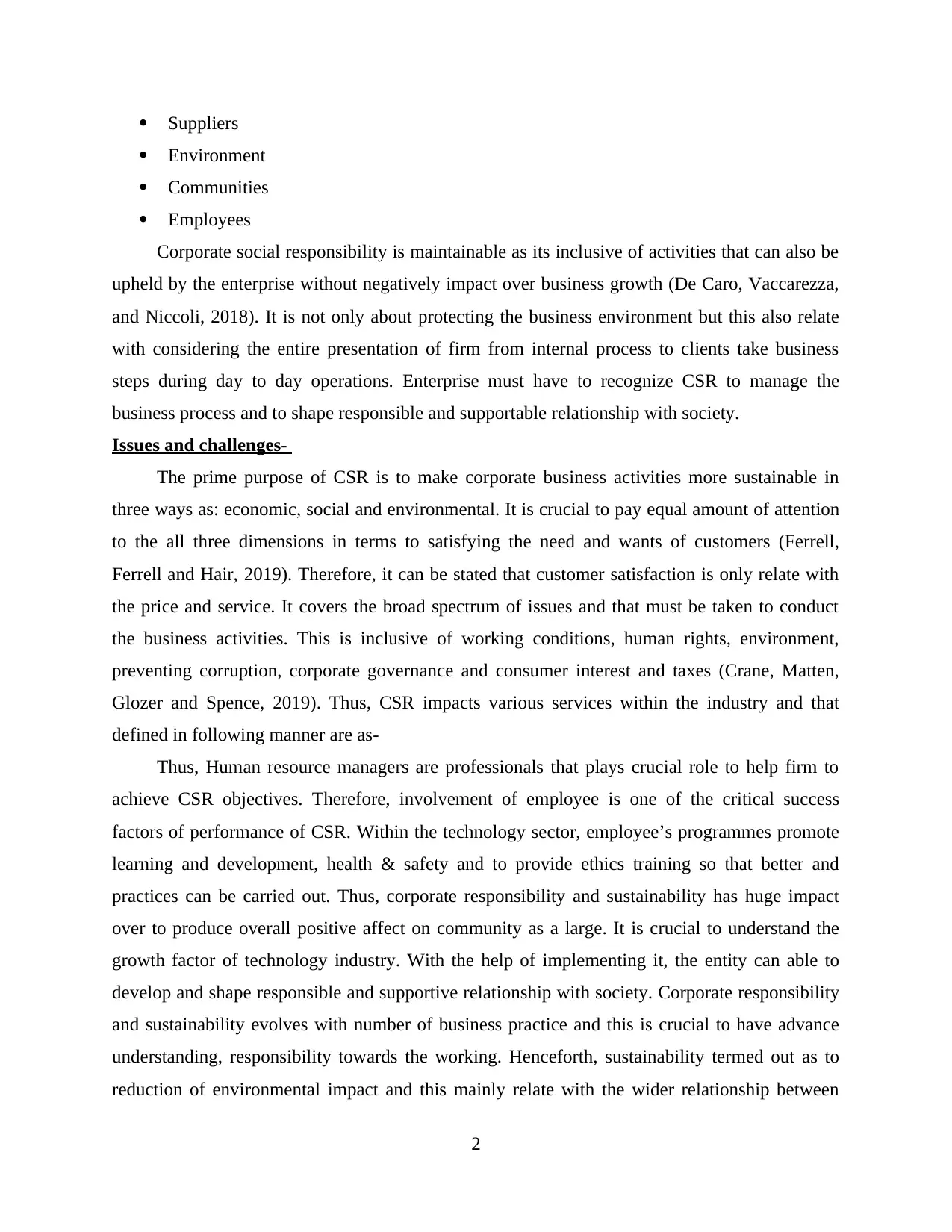
Suppliers
Environment
Communities
Employees
Corporate social responsibility is maintainable as its inclusive of activities that can also be
upheld by the enterprise without negatively impact over business growth (De Caro, Vaccarezza,
and Niccoli, 2018). It is not only about protecting the business environment but this also relate
with considering the entire presentation of firm from internal process to clients take business
steps during day to day operations. Enterprise must have to recognize CSR to manage the
business process and to shape responsible and supportable relationship with society.
Issues and challenges-
The prime purpose of CSR is to make corporate business activities more sustainable in
three ways as: economic, social and environmental. It is crucial to pay equal amount of attention
to the all three dimensions in terms to satisfying the need and wants of customers (Ferrell,
Ferrell and Hair, 2019). Therefore, it can be stated that customer satisfaction is only relate with
the price and service. It covers the broad spectrum of issues and that must be taken to conduct
the business activities. This is inclusive of working conditions, human rights, environment,
preventing corruption, corporate governance and consumer interest and taxes (Crane, Matten,
Glozer and Spence, 2019). Thus, CSR impacts various services within the industry and that
defined in following manner are as-
Thus, Human resource managers are professionals that plays crucial role to help firm to
achieve CSR objectives. Therefore, involvement of employee is one of the critical success
factors of performance of CSR. Within the technology sector, employee’s programmes promote
learning and development, health & safety and to provide ethics training so that better and
practices can be carried out. Thus, corporate responsibility and sustainability has huge impact
over to produce overall positive affect on community as a large. It is crucial to understand the
growth factor of technology industry. With the help of implementing it, the entity can able to
develop and shape responsible and supportive relationship with society. Corporate responsibility
and sustainability evolves with number of business practice and this is crucial to have advance
understanding, responsibility towards the working. Henceforth, sustainability termed out as to
reduction of environmental impact and this mainly relate with the wider relationship between
2
Environment
Communities
Employees
Corporate social responsibility is maintainable as its inclusive of activities that can also be
upheld by the enterprise without negatively impact over business growth (De Caro, Vaccarezza,
and Niccoli, 2018). It is not only about protecting the business environment but this also relate
with considering the entire presentation of firm from internal process to clients take business
steps during day to day operations. Enterprise must have to recognize CSR to manage the
business process and to shape responsible and supportable relationship with society.
Issues and challenges-
The prime purpose of CSR is to make corporate business activities more sustainable in
three ways as: economic, social and environmental. It is crucial to pay equal amount of attention
to the all three dimensions in terms to satisfying the need and wants of customers (Ferrell,
Ferrell and Hair, 2019). Therefore, it can be stated that customer satisfaction is only relate with
the price and service. It covers the broad spectrum of issues and that must be taken to conduct
the business activities. This is inclusive of working conditions, human rights, environment,
preventing corruption, corporate governance and consumer interest and taxes (Crane, Matten,
Glozer and Spence, 2019). Thus, CSR impacts various services within the industry and that
defined in following manner are as-
Thus, Human resource managers are professionals that plays crucial role to help firm to
achieve CSR objectives. Therefore, involvement of employee is one of the critical success
factors of performance of CSR. Within the technology sector, employee’s programmes promote
learning and development, health & safety and to provide ethics training so that better and
practices can be carried out. Thus, corporate responsibility and sustainability has huge impact
over to produce overall positive affect on community as a large. It is crucial to understand the
growth factor of technology industry. With the help of implementing it, the entity can able to
develop and shape responsible and supportive relationship with society. Corporate responsibility
and sustainability evolves with number of business practice and this is crucial to have advance
understanding, responsibility towards the working. Henceforth, sustainability termed out as to
reduction of environmental impact and this mainly relate with the wider relationship between
2
Paraphrase This Document
Need a fresh take? Get an instant paraphrase of this document with our AI Paraphraser
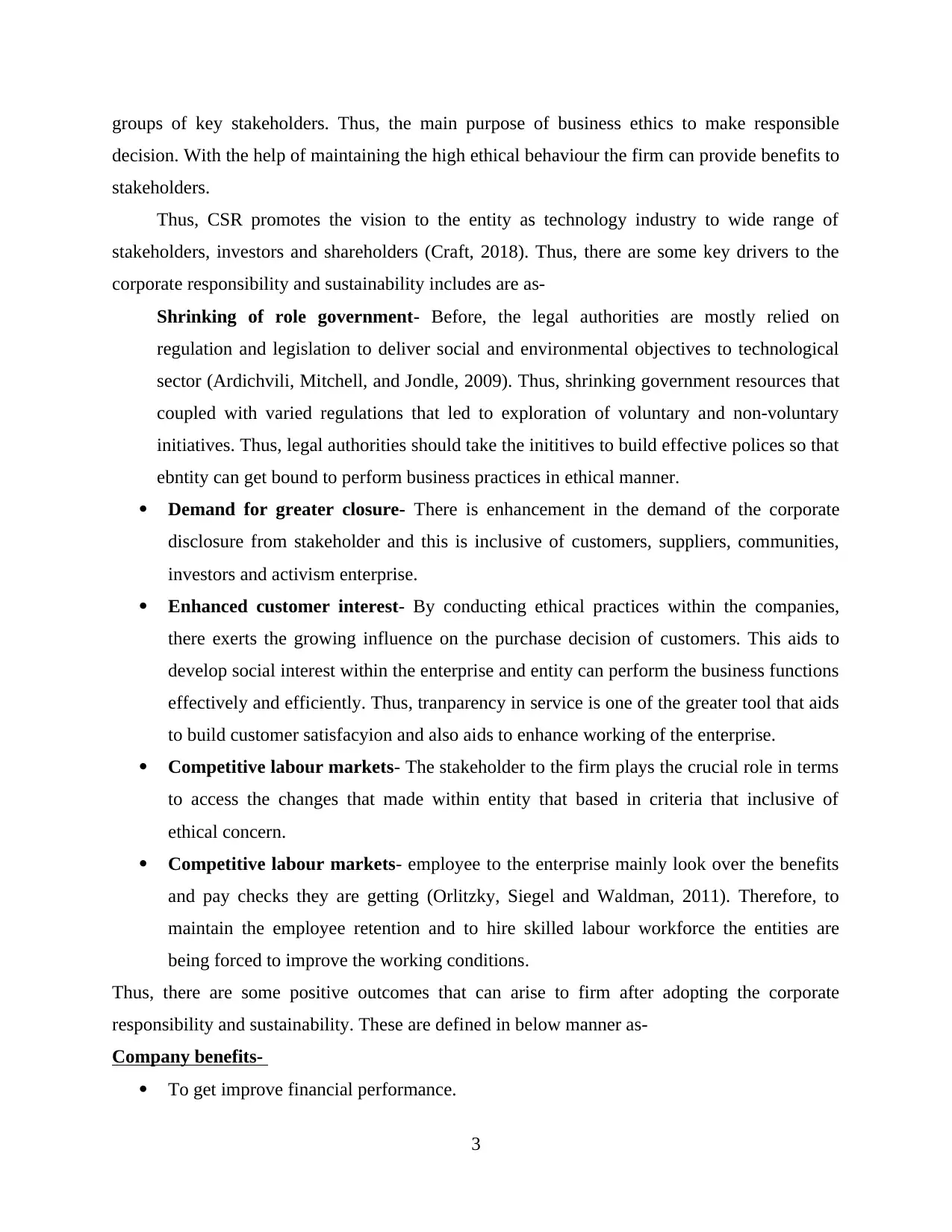
groups of key stakeholders. Thus, the main purpose of business ethics to make responsible
decision. With the help of maintaining the high ethical behaviour the firm can provide benefits to
stakeholders.
Thus, CSR promotes the vision to the entity as technology industry to wide range of
stakeholders, investors and shareholders (Craft, 2018). Thus, there are some key drivers to the
corporate responsibility and sustainability includes are as-
Shrinking of role government- Before, the legal authorities are mostly relied on
regulation and legislation to deliver social and environmental objectives to technological
sector (Ardichvili, Mitchell, and Jondle, 2009). Thus, shrinking government resources that
coupled with varied regulations that led to exploration of voluntary and non-voluntary
initiatives. Thus, legal authorities should take the inititives to build effective polices so that
ebntity can get bound to perform business practices in ethical manner.
Demand for greater closure- There is enhancement in the demand of the corporate
disclosure from stakeholder and this is inclusive of customers, suppliers, communities,
investors and activism enterprise.
Enhanced customer interest- By conducting ethical practices within the companies,
there exerts the growing influence on the purchase decision of customers. This aids to
develop social interest within the enterprise and entity can perform the business functions
effectively and efficiently. Thus, tranparency in service is one of the greater tool that aids
to build customer satisfacyion and also aids to enhance working of the enterprise.
Competitive labour markets- The stakeholder to the firm plays the crucial role in terms
to access the changes that made within entity that based in criteria that inclusive of
ethical concern.
Competitive labour markets- employee to the enterprise mainly look over the benefits
and pay checks they are getting (Orlitzky, Siegel and Waldman, 2011). Therefore, to
maintain the employee retention and to hire skilled labour workforce the entities are
being forced to improve the working conditions.
Thus, there are some positive outcomes that can arise to firm after adopting the corporate
responsibility and sustainability. These are defined in below manner as-
Company benefits-
To get improve financial performance.
3
decision. With the help of maintaining the high ethical behaviour the firm can provide benefits to
stakeholders.
Thus, CSR promotes the vision to the entity as technology industry to wide range of
stakeholders, investors and shareholders (Craft, 2018). Thus, there are some key drivers to the
corporate responsibility and sustainability includes are as-
Shrinking of role government- Before, the legal authorities are mostly relied on
regulation and legislation to deliver social and environmental objectives to technological
sector (Ardichvili, Mitchell, and Jondle, 2009). Thus, shrinking government resources that
coupled with varied regulations that led to exploration of voluntary and non-voluntary
initiatives. Thus, legal authorities should take the inititives to build effective polices so that
ebntity can get bound to perform business practices in ethical manner.
Demand for greater closure- There is enhancement in the demand of the corporate
disclosure from stakeholder and this is inclusive of customers, suppliers, communities,
investors and activism enterprise.
Enhanced customer interest- By conducting ethical practices within the companies,
there exerts the growing influence on the purchase decision of customers. This aids to
develop social interest within the enterprise and entity can perform the business functions
effectively and efficiently. Thus, tranparency in service is one of the greater tool that aids
to build customer satisfacyion and also aids to enhance working of the enterprise.
Competitive labour markets- The stakeholder to the firm plays the crucial role in terms
to access the changes that made within entity that based in criteria that inclusive of
ethical concern.
Competitive labour markets- employee to the enterprise mainly look over the benefits
and pay checks they are getting (Orlitzky, Siegel and Waldman, 2011). Therefore, to
maintain the employee retention and to hire skilled labour workforce the entities are
being forced to improve the working conditions.
Thus, there are some positive outcomes that can arise to firm after adopting the corporate
responsibility and sustainability. These are defined in below manner as-
Company benefits-
To get improve financial performance.
3
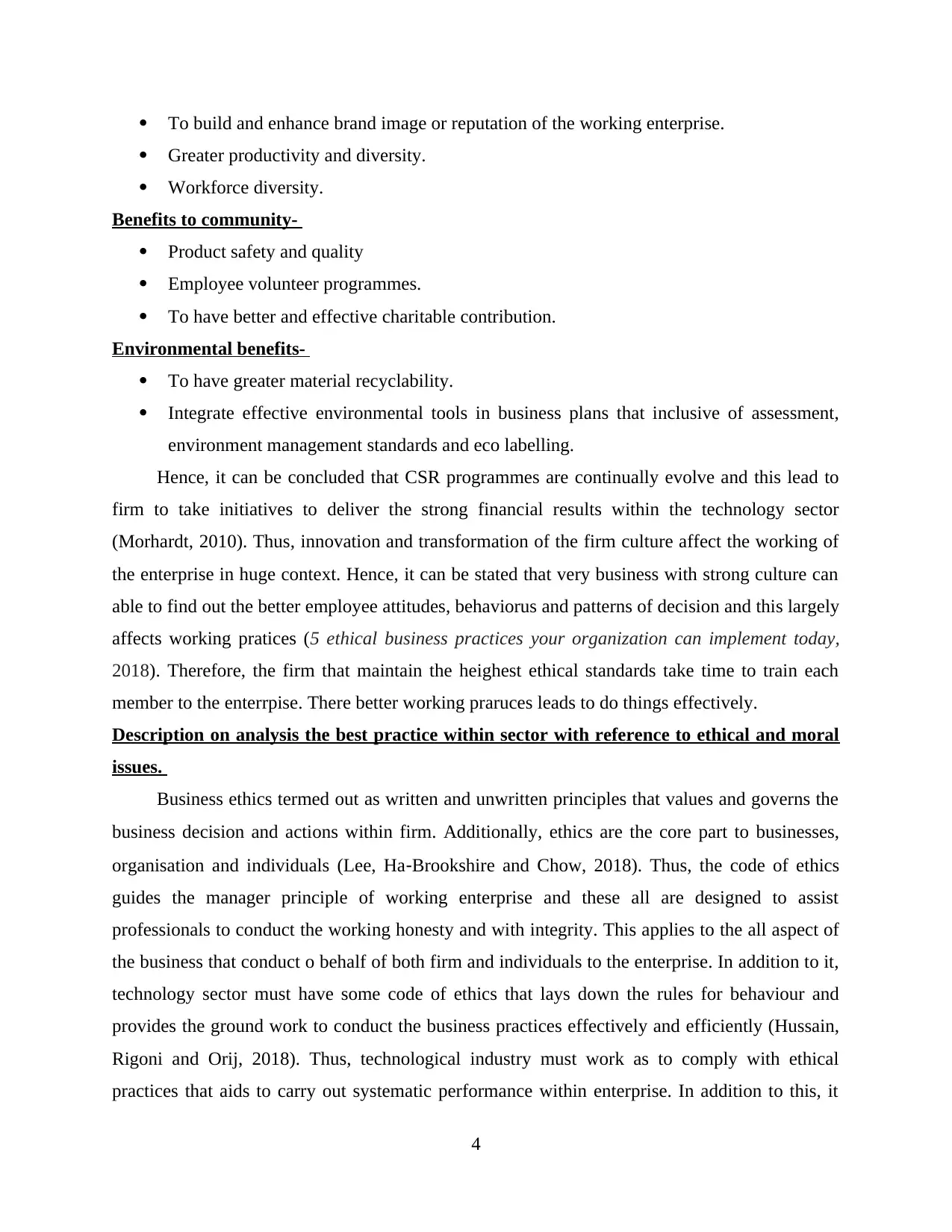
To build and enhance brand image or reputation of the working enterprise.
Greater productivity and diversity.
Workforce diversity.
Benefits to community-
Product safety and quality
Employee volunteer programmes.
To have better and effective charitable contribution.
Environmental benefits-
To have greater material recyclability.
Integrate effective environmental tools in business plans that inclusive of assessment,
environment management standards and eco labelling.
Hence, it can be concluded that CSR programmes are continually evolve and this lead to
firm to take initiatives to deliver the strong financial results within the technology sector
(Morhardt, 2010). Thus, innovation and transformation of the firm culture affect the working of
the enterprise in huge context. Hence, it can be stated that very business with strong culture can
able to find out the better employee attitudes, behaviorus and patterns of decision and this largely
affects working pratices (5 ethical business practices your organization can implement today,
2018). Therefore, the firm that maintain the heighest ethical standards take time to train each
member to the enterrpise. There better working praruces leads to do things effectively.
Description on analysis the best practice within sector with reference to ethical and moral
issues.
Business ethics termed out as written and unwritten principles that values and governs the
business decision and actions within firm. Additionally, ethics are the core part to businesses,
organisation and individuals (Lee, Ha‐Brookshire and Chow, 2018). Thus, the code of ethics
guides the manager principle of working enterprise and these all are designed to assist
professionals to conduct the working honesty and with integrity. This applies to the all aspect of
the business that conduct o behalf of both firm and individuals to the enterprise. In addition to it,
technology sector must have some code of ethics that lays down the rules for behaviour and
provides the ground work to conduct the business practices effectively and efficiently (Hussain,
Rigoni and Orij, 2018). Thus, technological industry must work as to comply with ethical
practices that aids to carry out systematic performance within enterprise. In addition to this, it
4
Greater productivity and diversity.
Workforce diversity.
Benefits to community-
Product safety and quality
Employee volunteer programmes.
To have better and effective charitable contribution.
Environmental benefits-
To have greater material recyclability.
Integrate effective environmental tools in business plans that inclusive of assessment,
environment management standards and eco labelling.
Hence, it can be concluded that CSR programmes are continually evolve and this lead to
firm to take initiatives to deliver the strong financial results within the technology sector
(Morhardt, 2010). Thus, innovation and transformation of the firm culture affect the working of
the enterprise in huge context. Hence, it can be stated that very business with strong culture can
able to find out the better employee attitudes, behaviorus and patterns of decision and this largely
affects working pratices (5 ethical business practices your organization can implement today,
2018). Therefore, the firm that maintain the heighest ethical standards take time to train each
member to the enterrpise. There better working praruces leads to do things effectively.
Description on analysis the best practice within sector with reference to ethical and moral
issues.
Business ethics termed out as written and unwritten principles that values and governs the
business decision and actions within firm. Additionally, ethics are the core part to businesses,
organisation and individuals (Lee, Ha‐Brookshire and Chow, 2018). Thus, the code of ethics
guides the manager principle of working enterprise and these all are designed to assist
professionals to conduct the working honesty and with integrity. This applies to the all aspect of
the business that conduct o behalf of both firm and individuals to the enterprise. In addition to it,
technology sector must have some code of ethics that lays down the rules for behaviour and
provides the ground work to conduct the business practices effectively and efficiently (Hussain,
Rigoni and Orij, 2018). Thus, technological industry must work as to comply with ethical
practices that aids to carry out systematic performance within enterprise. In addition to this, it
4
⊘ This is a preview!⊘
Do you want full access?
Subscribe today to unlock all pages.

Trusted by 1+ million students worldwide
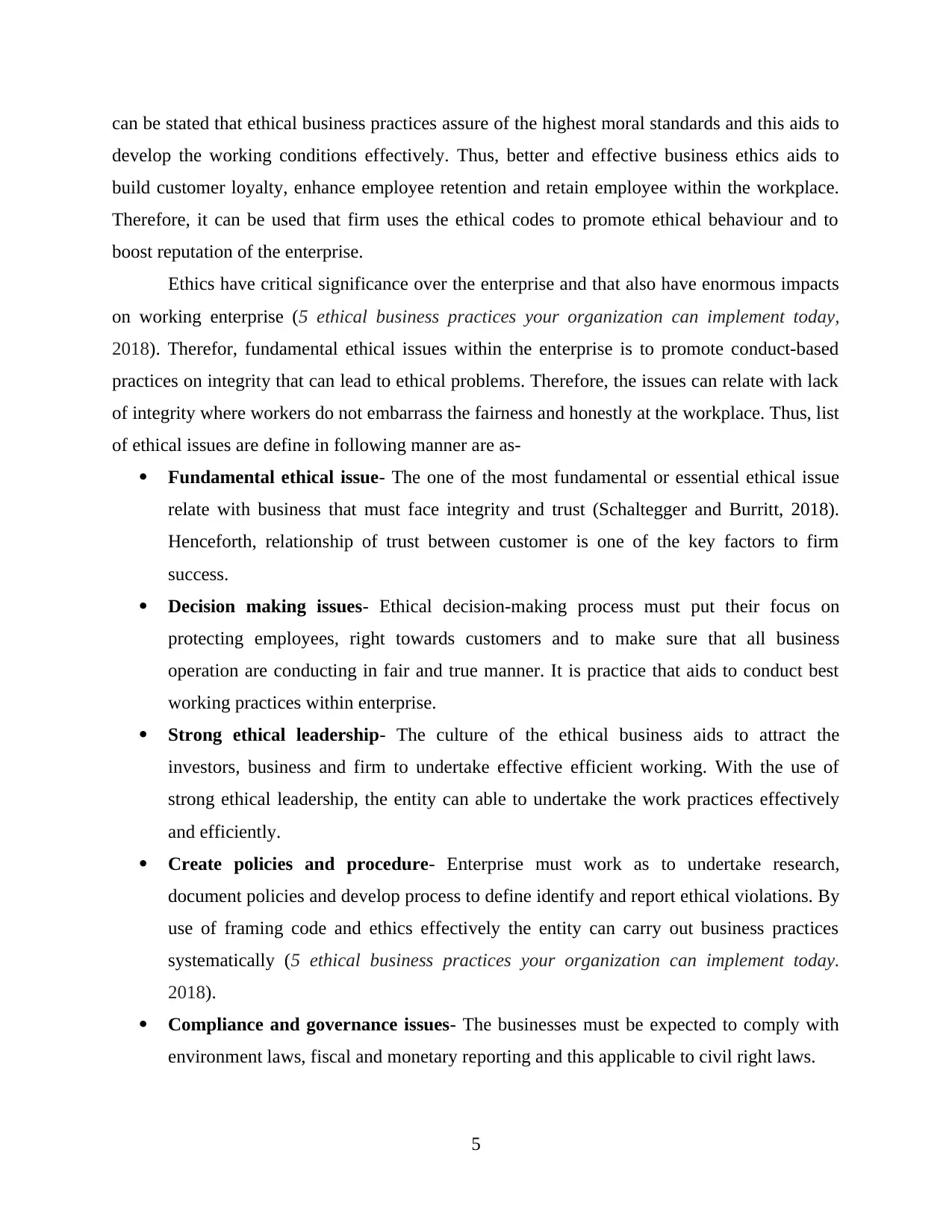
can be stated that ethical business practices assure of the highest moral standards and this aids to
develop the working conditions effectively. Thus, better and effective business ethics aids to
build customer loyalty, enhance employee retention and retain employee within the workplace.
Therefore, it can be used that firm uses the ethical codes to promote ethical behaviour and to
boost reputation of the enterprise.
Ethics have critical significance over the enterprise and that also have enormous impacts
on working enterprise (5 ethical business practices your organization can implement today,
2018). Therefor, fundamental ethical issues within the enterprise is to promote conduct-based
practices on integrity that can lead to ethical problems. Therefore, the issues can relate with lack
of integrity where workers do not embarrass the fairness and honestly at the workplace. Thus, list
of ethical issues are define in following manner are as-
Fundamental ethical issue- The one of the most fundamental or essential ethical issue
relate with business that must face integrity and trust (Schaltegger and Burritt, 2018).
Henceforth, relationship of trust between customer is one of the key factors to firm
success.
Decision making issues- Ethical decision-making process must put their focus on
protecting employees, right towards customers and to make sure that all business
operation are conducting in fair and true manner. It is practice that aids to conduct best
working practices within enterprise.
Strong ethical leadership- The culture of the ethical business aids to attract the
investors, business and firm to undertake effective efficient working. With the use of
strong ethical leadership, the entity can able to undertake the work practices effectively
and efficiently.
Create policies and procedure- Enterprise must work as to undertake research,
document policies and develop process to define identify and report ethical violations. By
use of framing code and ethics effectively the entity can carry out business practices
systematically (5 ethical business practices your organization can implement today.
2018).
Compliance and governance issues- The businesses must be expected to comply with
environment laws, fiscal and monetary reporting and this applicable to civil right laws.
5
develop the working conditions effectively. Thus, better and effective business ethics aids to
build customer loyalty, enhance employee retention and retain employee within the workplace.
Therefore, it can be used that firm uses the ethical codes to promote ethical behaviour and to
boost reputation of the enterprise.
Ethics have critical significance over the enterprise and that also have enormous impacts
on working enterprise (5 ethical business practices your organization can implement today,
2018). Therefor, fundamental ethical issues within the enterprise is to promote conduct-based
practices on integrity that can lead to ethical problems. Therefore, the issues can relate with lack
of integrity where workers do not embarrass the fairness and honestly at the workplace. Thus, list
of ethical issues are define in following manner are as-
Fundamental ethical issue- The one of the most fundamental or essential ethical issue
relate with business that must face integrity and trust (Schaltegger and Burritt, 2018).
Henceforth, relationship of trust between customer is one of the key factors to firm
success.
Decision making issues- Ethical decision-making process must put their focus on
protecting employees, right towards customers and to make sure that all business
operation are conducting in fair and true manner. It is practice that aids to conduct best
working practices within enterprise.
Strong ethical leadership- The culture of the ethical business aids to attract the
investors, business and firm to undertake effective efficient working. With the use of
strong ethical leadership, the entity can able to undertake the work practices effectively
and efficiently.
Create policies and procedure- Enterprise must work as to undertake research,
document policies and develop process to define identify and report ethical violations. By
use of framing code and ethics effectively the entity can carry out business practices
systematically (5 ethical business practices your organization can implement today.
2018).
Compliance and governance issues- The businesses must be expected to comply with
environment laws, fiscal and monetary reporting and this applicable to civil right laws.
5
Paraphrase This Document
Need a fresh take? Get an instant paraphrase of this document with our AI Paraphraser
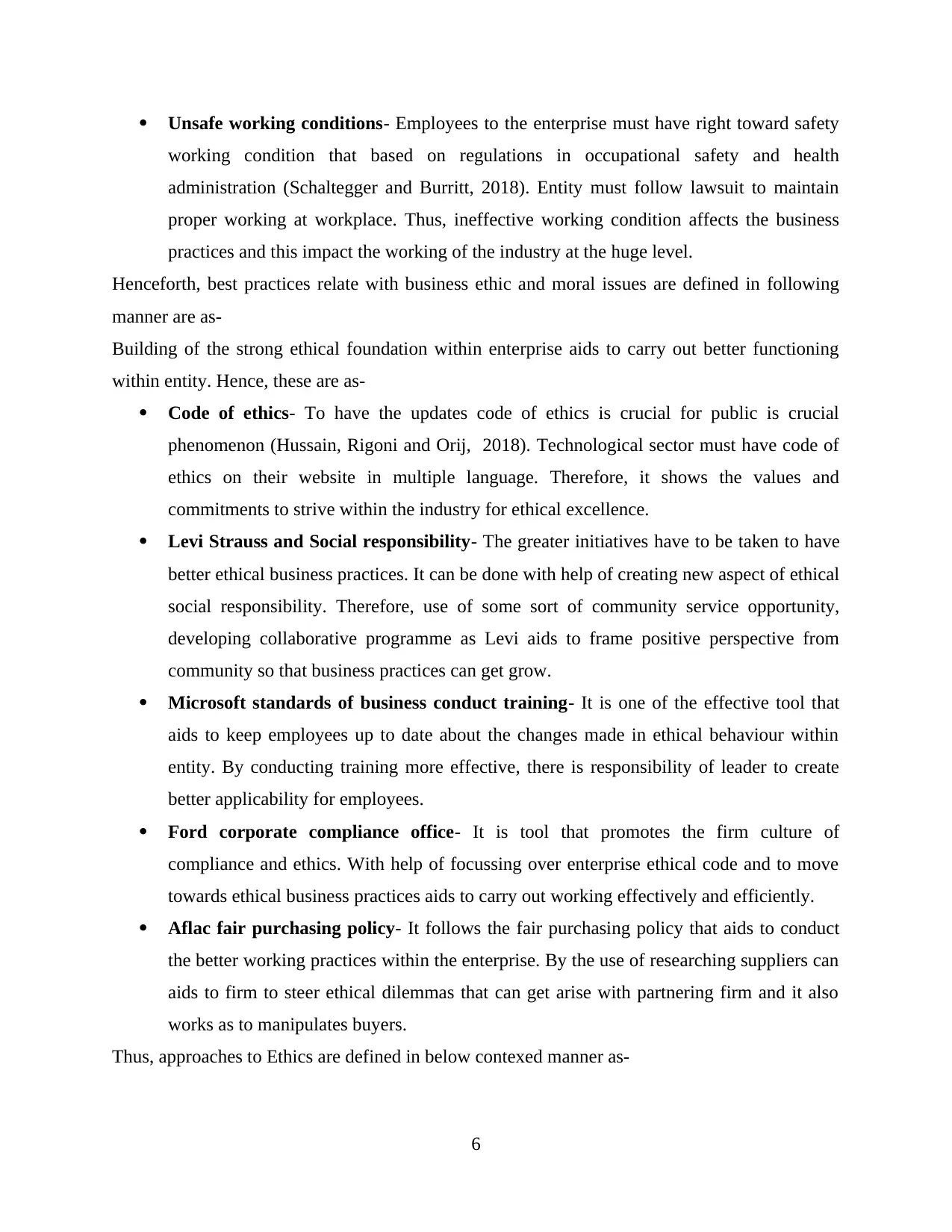
Unsafe working conditions- Employees to the enterprise must have right toward safety
working condition that based on regulations in occupational safety and health
administration (Schaltegger and Burritt, 2018). Entity must follow lawsuit to maintain
proper working at workplace. Thus, ineffective working condition affects the business
practices and this impact the working of the industry at the huge level.
Henceforth, best practices relate with business ethic and moral issues are defined in following
manner are as-
Building of the strong ethical foundation within enterprise aids to carry out better functioning
within entity. Hence, these are as-
Code of ethics- To have the updates code of ethics is crucial for public is crucial
phenomenon (Hussain, Rigoni and Orij, 2018). Technological sector must have code of
ethics on their website in multiple language. Therefore, it shows the values and
commitments to strive within the industry for ethical excellence.
Levi Strauss and Social responsibility- The greater initiatives have to be taken to have
better ethical business practices. It can be done with help of creating new aspect of ethical
social responsibility. Therefore, use of some sort of community service opportunity,
developing collaborative programme as Levi aids to frame positive perspective from
community so that business practices can get grow.
Microsoft standards of business conduct training- It is one of the effective tool that
aids to keep employees up to date about the changes made in ethical behaviour within
entity. By conducting training more effective, there is responsibility of leader to create
better applicability for employees.
Ford corporate compliance office- It is tool that promotes the firm culture of
compliance and ethics. With help of focussing over enterprise ethical code and to move
towards ethical business practices aids to carry out working effectively and efficiently.
Aflac fair purchasing policy- It follows the fair purchasing policy that aids to conduct
the better working practices within the enterprise. By the use of researching suppliers can
aids to firm to steer ethical dilemmas that can get arise with partnering firm and it also
works as to manipulates buyers.
Thus, approaches to Ethics are defined in below contexed manner as-
6
working condition that based on regulations in occupational safety and health
administration (Schaltegger and Burritt, 2018). Entity must follow lawsuit to maintain
proper working at workplace. Thus, ineffective working condition affects the business
practices and this impact the working of the industry at the huge level.
Henceforth, best practices relate with business ethic and moral issues are defined in following
manner are as-
Building of the strong ethical foundation within enterprise aids to carry out better functioning
within entity. Hence, these are as-
Code of ethics- To have the updates code of ethics is crucial for public is crucial
phenomenon (Hussain, Rigoni and Orij, 2018). Technological sector must have code of
ethics on their website in multiple language. Therefore, it shows the values and
commitments to strive within the industry for ethical excellence.
Levi Strauss and Social responsibility- The greater initiatives have to be taken to have
better ethical business practices. It can be done with help of creating new aspect of ethical
social responsibility. Therefore, use of some sort of community service opportunity,
developing collaborative programme as Levi aids to frame positive perspective from
community so that business practices can get grow.
Microsoft standards of business conduct training- It is one of the effective tool that
aids to keep employees up to date about the changes made in ethical behaviour within
entity. By conducting training more effective, there is responsibility of leader to create
better applicability for employees.
Ford corporate compliance office- It is tool that promotes the firm culture of
compliance and ethics. With help of focussing over enterprise ethical code and to move
towards ethical business practices aids to carry out working effectively and efficiently.
Aflac fair purchasing policy- It follows the fair purchasing policy that aids to conduct
the better working practices within the enterprise. By the use of researching suppliers can
aids to firm to steer ethical dilemmas that can get arise with partnering firm and it also
works as to manipulates buyers.
Thus, approaches to Ethics are defined in below contexed manner as-
6
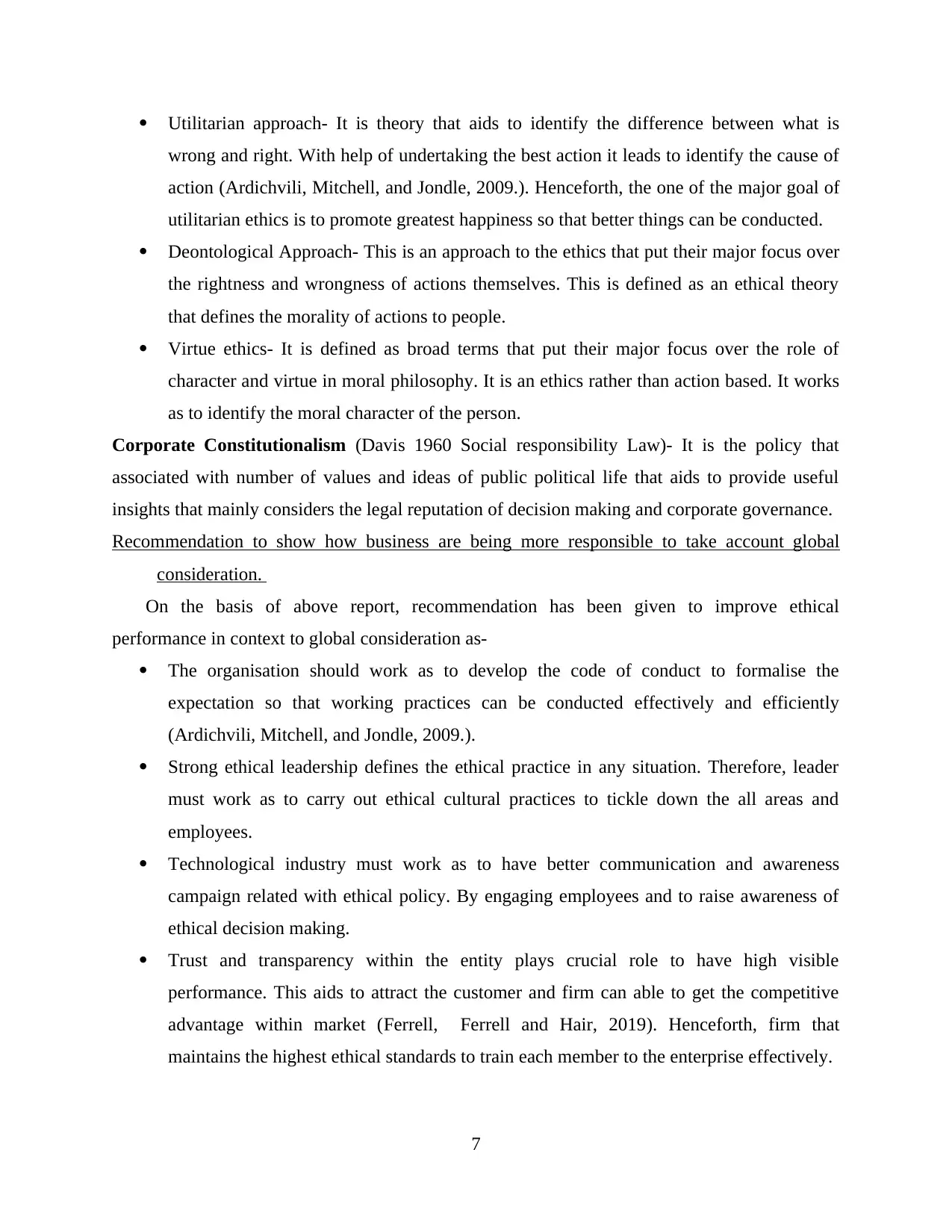
Utilitarian approach- It is theory that aids to identify the difference between what is
wrong and right. With help of undertaking the best action it leads to identify the cause of
action (Ardichvili, Mitchell, and Jondle, 2009.). Henceforth, the one of the major goal of
utilitarian ethics is to promote greatest happiness so that better things can be conducted.
Deontological Approach- This is an approach to the ethics that put their major focus over
the rightness and wrongness of actions themselves. This is defined as an ethical theory
that defines the morality of actions to people.
Virtue ethics- It is defined as broad terms that put their major focus over the role of
character and virtue in moral philosophy. It is an ethics rather than action based. It works
as to identify the moral character of the person.
Corporate Constitutionalism (Davis 1960 Social responsibility Law)- It is the policy that
associated with number of values and ideas of public political life that aids to provide useful
insights that mainly considers the legal reputation of decision making and corporate governance.
Recommendation to show how business are being more responsible to take account global
consideration.
On the basis of above report, recommendation has been given to improve ethical
performance in context to global consideration as-
The organisation should work as to develop the code of conduct to formalise the
expectation so that working practices can be conducted effectively and efficiently
(Ardichvili, Mitchell, and Jondle, 2009.).
Strong ethical leadership defines the ethical practice in any situation. Therefore, leader
must work as to carry out ethical cultural practices to tickle down the all areas and
employees.
Technological industry must work as to have better communication and awareness
campaign related with ethical policy. By engaging employees and to raise awareness of
ethical decision making.
Trust and transparency within the entity plays crucial role to have high visible
performance. This aids to attract the customer and firm can able to get the competitive
advantage within market (Ferrell, Ferrell and Hair, 2019). Henceforth, firm that
maintains the highest ethical standards to train each member to the enterprise effectively.
7
wrong and right. With help of undertaking the best action it leads to identify the cause of
action (Ardichvili, Mitchell, and Jondle, 2009.). Henceforth, the one of the major goal of
utilitarian ethics is to promote greatest happiness so that better things can be conducted.
Deontological Approach- This is an approach to the ethics that put their major focus over
the rightness and wrongness of actions themselves. This is defined as an ethical theory
that defines the morality of actions to people.
Virtue ethics- It is defined as broad terms that put their major focus over the role of
character and virtue in moral philosophy. It is an ethics rather than action based. It works
as to identify the moral character of the person.
Corporate Constitutionalism (Davis 1960 Social responsibility Law)- It is the policy that
associated with number of values and ideas of public political life that aids to provide useful
insights that mainly considers the legal reputation of decision making and corporate governance.
Recommendation to show how business are being more responsible to take account global
consideration.
On the basis of above report, recommendation has been given to improve ethical
performance in context to global consideration as-
The organisation should work as to develop the code of conduct to formalise the
expectation so that working practices can be conducted effectively and efficiently
(Ardichvili, Mitchell, and Jondle, 2009.).
Strong ethical leadership defines the ethical practice in any situation. Therefore, leader
must work as to carry out ethical cultural practices to tickle down the all areas and
employees.
Technological industry must work as to have better communication and awareness
campaign related with ethical policy. By engaging employees and to raise awareness of
ethical decision making.
Trust and transparency within the entity plays crucial role to have high visible
performance. This aids to attract the customer and firm can able to get the competitive
advantage within market (Ferrell, Ferrell and Hair, 2019). Henceforth, firm that
maintains the highest ethical standards to train each member to the enterprise effectively.
7
⊘ This is a preview!⊘
Do you want full access?
Subscribe today to unlock all pages.

Trusted by 1+ million students worldwide
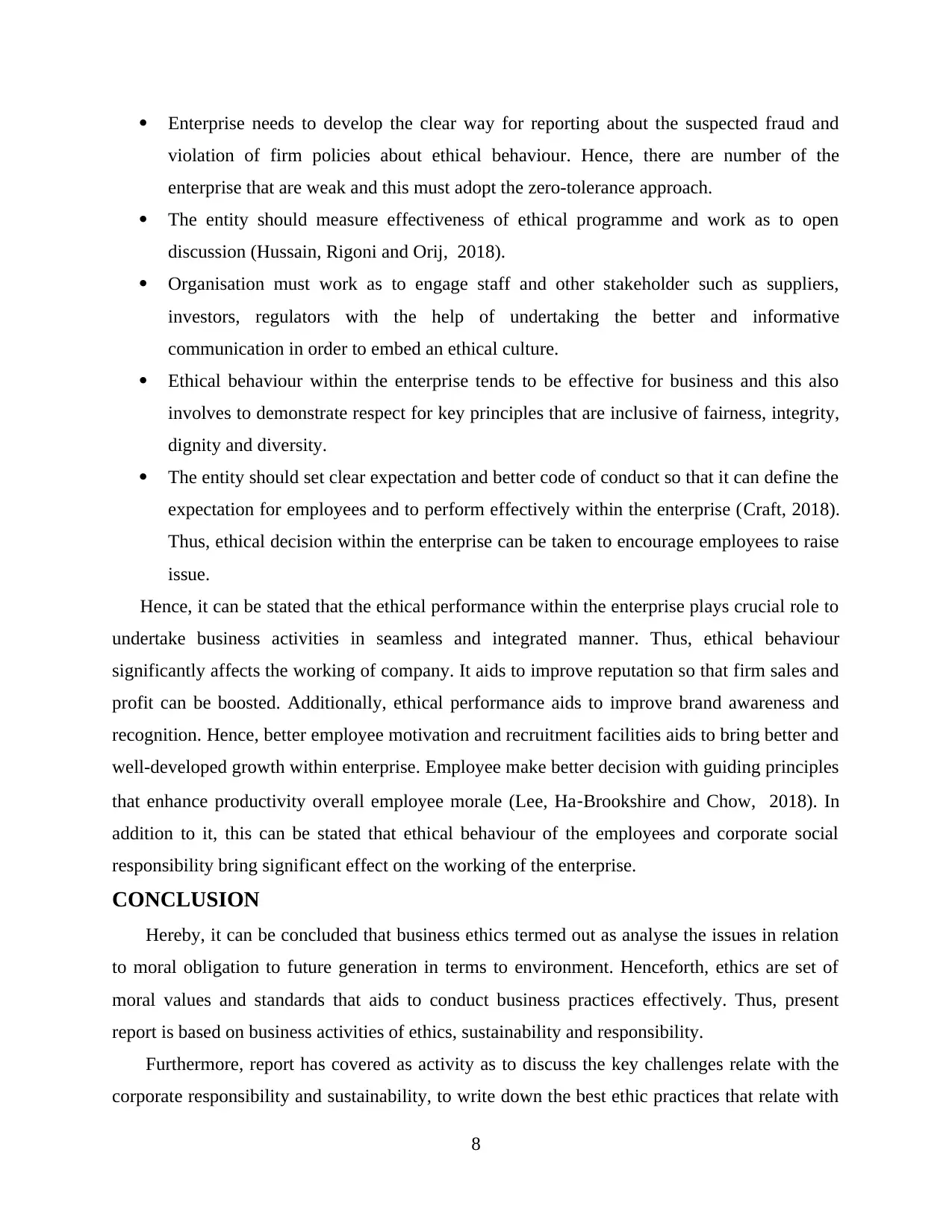
Enterprise needs to develop the clear way for reporting about the suspected fraud and
violation of firm policies about ethical behaviour. Hence, there are number of the
enterprise that are weak and this must adopt the zero-tolerance approach.
The entity should measure effectiveness of ethical programme and work as to open
discussion (Hussain, Rigoni and Orij, 2018).
Organisation must work as to engage staff and other stakeholder such as suppliers,
investors, regulators with the help of undertaking the better and informative
communication in order to embed an ethical culture.
Ethical behaviour within the enterprise tends to be effective for business and this also
involves to demonstrate respect for key principles that are inclusive of fairness, integrity,
dignity and diversity.
The entity should set clear expectation and better code of conduct so that it can define the
expectation for employees and to perform effectively within the enterprise (Craft, 2018).
Thus, ethical decision within the enterprise can be taken to encourage employees to raise
issue.
Hence, it can be stated that the ethical performance within the enterprise plays crucial role to
undertake business activities in seamless and integrated manner. Thus, ethical behaviour
significantly affects the working of company. It aids to improve reputation so that firm sales and
profit can be boosted. Additionally, ethical performance aids to improve brand awareness and
recognition. Hence, better employee motivation and recruitment facilities aids to bring better and
well-developed growth within enterprise. Employee make better decision with guiding principles
that enhance productivity overall employee morale (Lee, Ha‐Brookshire and Chow, 2018). In
addition to it, this can be stated that ethical behaviour of the employees and corporate social
responsibility bring significant effect on the working of the enterprise.
CONCLUSION
Hereby, it can be concluded that business ethics termed out as analyse the issues in relation
to moral obligation to future generation in terms to environment. Henceforth, ethics are set of
moral values and standards that aids to conduct business practices effectively. Thus, present
report is based on business activities of ethics, sustainability and responsibility.
Furthermore, report has covered as activity as to discuss the key challenges relate with the
corporate responsibility and sustainability, to write down the best ethic practices that relate with
8
violation of firm policies about ethical behaviour. Hence, there are number of the
enterprise that are weak and this must adopt the zero-tolerance approach.
The entity should measure effectiveness of ethical programme and work as to open
discussion (Hussain, Rigoni and Orij, 2018).
Organisation must work as to engage staff and other stakeholder such as suppliers,
investors, regulators with the help of undertaking the better and informative
communication in order to embed an ethical culture.
Ethical behaviour within the enterprise tends to be effective for business and this also
involves to demonstrate respect for key principles that are inclusive of fairness, integrity,
dignity and diversity.
The entity should set clear expectation and better code of conduct so that it can define the
expectation for employees and to perform effectively within the enterprise (Craft, 2018).
Thus, ethical decision within the enterprise can be taken to encourage employees to raise
issue.
Hence, it can be stated that the ethical performance within the enterprise plays crucial role to
undertake business activities in seamless and integrated manner. Thus, ethical behaviour
significantly affects the working of company. It aids to improve reputation so that firm sales and
profit can be boosted. Additionally, ethical performance aids to improve brand awareness and
recognition. Hence, better employee motivation and recruitment facilities aids to bring better and
well-developed growth within enterprise. Employee make better decision with guiding principles
that enhance productivity overall employee morale (Lee, Ha‐Brookshire and Chow, 2018). In
addition to it, this can be stated that ethical behaviour of the employees and corporate social
responsibility bring significant effect on the working of the enterprise.
CONCLUSION
Hereby, it can be concluded that business ethics termed out as analyse the issues in relation
to moral obligation to future generation in terms to environment. Henceforth, ethics are set of
moral values and standards that aids to conduct business practices effectively. Thus, present
report is based on business activities of ethics, sustainability and responsibility.
Furthermore, report has covered as activity as to discuss the key challenges relate with the
corporate responsibility and sustainability, to write down the best ethic practices that relate with
8
Paraphrase This Document
Need a fresh take? Get an instant paraphrase of this document with our AI Paraphraser

ethical and moral issues. Lastly, recommendation has been given in order to analyse that how
business be more responsible to take account on global consideration.
9
business be more responsible to take account on global consideration.
9
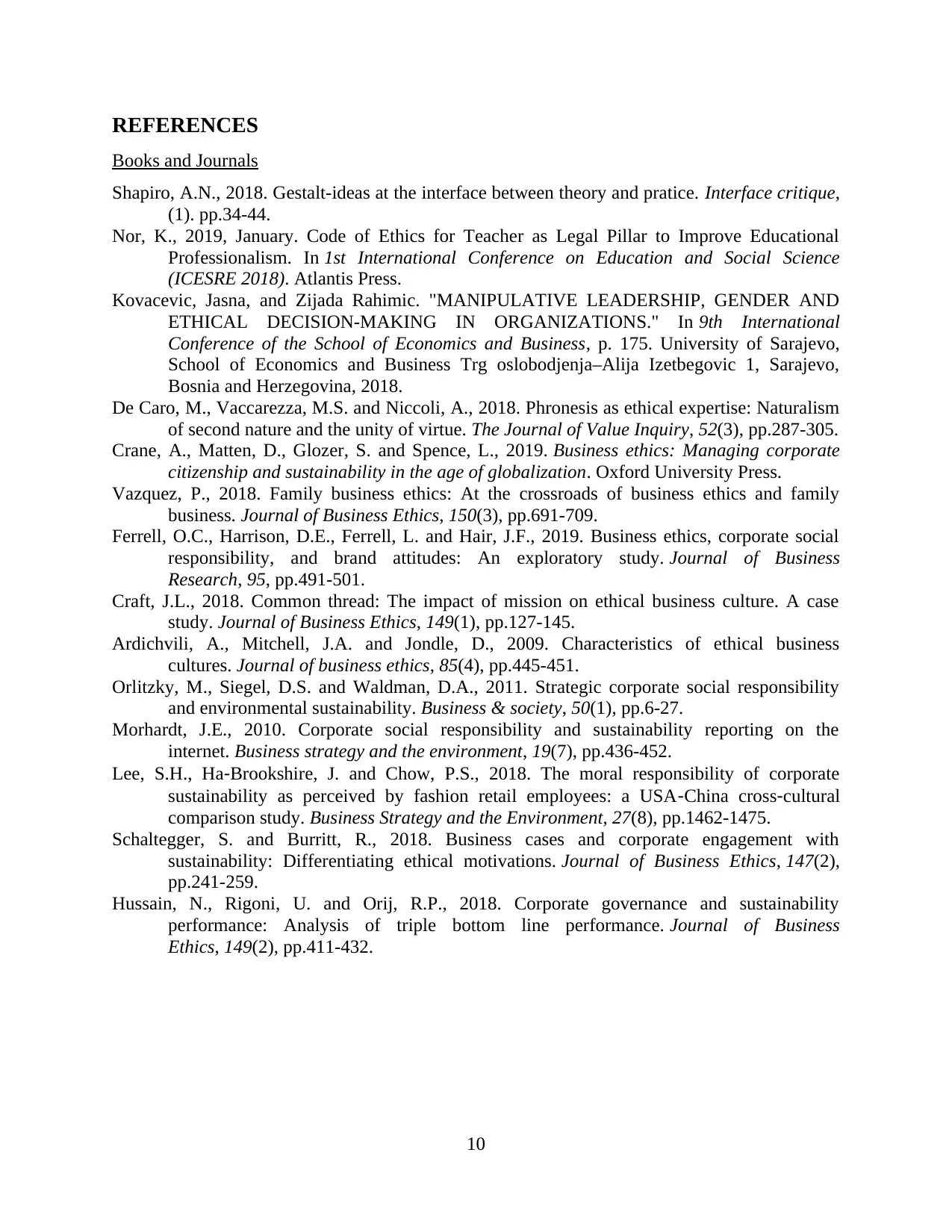
REFERENCES
Books and Journals
Shapiro, A.N., 2018. Gestalt-ideas at the interface between theory and pratice. Interface critique,
(1). pp.34-44.
Nor, K., 2019, January. Code of Ethics for Teacher as Legal Pillar to Improve Educational
Professionalism. In 1st International Conference on Education and Social Science
(ICESRE 2018). Atlantis Press.
Kovacevic, Jasna, and Zijada Rahimic. "MANIPULATIVE LEADERSHIP, GENDER AND
ETHICAL DECISION-MAKING IN ORGANIZATIONS." In 9th International
Conference of the School of Economics and Business, p. 175. University of Sarajevo,
School of Economics and Business Trg oslobodjenja–Alija Izetbegovic 1, Sarajevo,
Bosnia and Herzegovina, 2018.
De Caro, M., Vaccarezza, M.S. and Niccoli, A., 2018. Phronesis as ethical expertise: Naturalism
of second nature and the unity of virtue. The Journal of Value Inquiry, 52(3), pp.287-305.
Crane, A., Matten, D., Glozer, S. and Spence, L., 2019. Business ethics: Managing corporate
citizenship and sustainability in the age of globalization. Oxford University Press.
Vazquez, P., 2018. Family business ethics: At the crossroads of business ethics and family
business. Journal of Business Ethics, 150(3), pp.691-709.
Ferrell, O.C., Harrison, D.E., Ferrell, L. and Hair, J.F., 2019. Business ethics, corporate social
responsibility, and brand attitudes: An exploratory study. Journal of Business
Research, 95, pp.491-501.
Craft, J.L., 2018. Common thread: The impact of mission on ethical business culture. A case
study. Journal of Business Ethics, 149(1), pp.127-145.
Ardichvili, A., Mitchell, J.A. and Jondle, D., 2009. Characteristics of ethical business
cultures. Journal of business ethics, 85(4), pp.445-451.
Orlitzky, M., Siegel, D.S. and Waldman, D.A., 2011. Strategic corporate social responsibility
and environmental sustainability. Business & society, 50(1), pp.6-27.
Morhardt, J.E., 2010. Corporate social responsibility and sustainability reporting on the
internet. Business strategy and the environment, 19(7), pp.436-452.
Lee, S.H., Ha‐Brookshire, J. and Chow, P.S., 2018. The moral responsibility of corporate
sustainability as perceived by fashion retail employees: a USA‐China cross‐cultural
comparison study. Business Strategy and the Environment, 27(8), pp.1462-1475.
Schaltegger, S. and Burritt, R., 2018. Business cases and corporate engagement with
sustainability: Differentiating ethical motivations. Journal of Business Ethics, 147(2),
pp.241-259.
Hussain, N., Rigoni, U. and Orij, R.P., 2018. Corporate governance and sustainability
performance: Analysis of triple bottom line performance. Journal of Business
Ethics, 149(2), pp.411-432.
10
Books and Journals
Shapiro, A.N., 2018. Gestalt-ideas at the interface between theory and pratice. Interface critique,
(1). pp.34-44.
Nor, K., 2019, January. Code of Ethics for Teacher as Legal Pillar to Improve Educational
Professionalism. In 1st International Conference on Education and Social Science
(ICESRE 2018). Atlantis Press.
Kovacevic, Jasna, and Zijada Rahimic. "MANIPULATIVE LEADERSHIP, GENDER AND
ETHICAL DECISION-MAKING IN ORGANIZATIONS." In 9th International
Conference of the School of Economics and Business, p. 175. University of Sarajevo,
School of Economics and Business Trg oslobodjenja–Alija Izetbegovic 1, Sarajevo,
Bosnia and Herzegovina, 2018.
De Caro, M., Vaccarezza, M.S. and Niccoli, A., 2018. Phronesis as ethical expertise: Naturalism
of second nature and the unity of virtue. The Journal of Value Inquiry, 52(3), pp.287-305.
Crane, A., Matten, D., Glozer, S. and Spence, L., 2019. Business ethics: Managing corporate
citizenship and sustainability in the age of globalization. Oxford University Press.
Vazquez, P., 2018. Family business ethics: At the crossroads of business ethics and family
business. Journal of Business Ethics, 150(3), pp.691-709.
Ferrell, O.C., Harrison, D.E., Ferrell, L. and Hair, J.F., 2019. Business ethics, corporate social
responsibility, and brand attitudes: An exploratory study. Journal of Business
Research, 95, pp.491-501.
Craft, J.L., 2018. Common thread: The impact of mission on ethical business culture. A case
study. Journal of Business Ethics, 149(1), pp.127-145.
Ardichvili, A., Mitchell, J.A. and Jondle, D., 2009. Characteristics of ethical business
cultures. Journal of business ethics, 85(4), pp.445-451.
Orlitzky, M., Siegel, D.S. and Waldman, D.A., 2011. Strategic corporate social responsibility
and environmental sustainability. Business & society, 50(1), pp.6-27.
Morhardt, J.E., 2010. Corporate social responsibility and sustainability reporting on the
internet. Business strategy and the environment, 19(7), pp.436-452.
Lee, S.H., Ha‐Brookshire, J. and Chow, P.S., 2018. The moral responsibility of corporate
sustainability as perceived by fashion retail employees: a USA‐China cross‐cultural
comparison study. Business Strategy and the Environment, 27(8), pp.1462-1475.
Schaltegger, S. and Burritt, R., 2018. Business cases and corporate engagement with
sustainability: Differentiating ethical motivations. Journal of Business Ethics, 147(2),
pp.241-259.
Hussain, N., Rigoni, U. and Orij, R.P., 2018. Corporate governance and sustainability
performance: Analysis of triple bottom line performance. Journal of Business
Ethics, 149(2), pp.411-432.
10
⊘ This is a preview!⊘
Do you want full access?
Subscribe today to unlock all pages.

Trusted by 1+ million students worldwide
1 out of 13
Related Documents
Your All-in-One AI-Powered Toolkit for Academic Success.
+13062052269
info@desklib.com
Available 24*7 on WhatsApp / Email
![[object Object]](/_next/static/media/star-bottom.7253800d.svg)
Unlock your academic potential
Copyright © 2020–2026 A2Z Services. All Rights Reserved. Developed and managed by ZUCOL.





